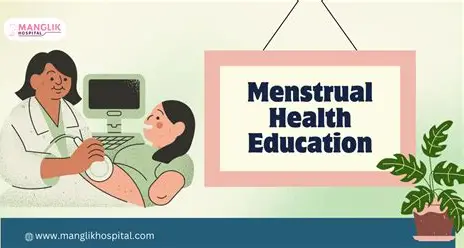Herein this article, we discussed Breaking the Silence, Why All Genders Need Menstrual Health Education, Beyond Biology: Why All Genders Need to Understand Menstrual Health, What Should Comprehensive Menstrual Education Include?
Menstruation is a natural biological process, yet it remains shrouded in stigma, shame, and misinformation in many societies. While the physical experience of menstruation is primarily associated with women and people assigned female at birth, menstrual health education should not be limited to just them. It’s time to expand the conversation and make menstrual health education inclusive for all genders.
Breaking the Silence
For generations, menstruation has been treated as a taboo subject. This culture of silence has led to ignorance, embarrassment, and sometimes even health issues due to a lack of knowledge. Teaching people of all genders about menstruation is key to breaking down these harmful barriers.
By normalizing conversations around periods, we promote empathy, support, and better health outcomes for everyone. Understanding menstruation helps reduce bullying in schools, supports trans and non-binary individuals, and fosters respect in relationships and workplaces.
Why All Genders Need Menstrual Health Education
- Promotes Empathy and Support
Boys and men who understand menstruation are more likely to show compassion and offer support, whether to classmates, friends, sisters, partners, or colleagues. This breaks down stereotypes and toxic masculinity.
- Helps End Period Stigma
Stigma thrives in silence. Educating everyone helps dismantle myths, like periods being “dirty” or “shameful,” and empowers those who menstruate to seek care and speak openly without fear.
- Inclusive Support for Trans and Non-Binary Individuals
Not all people who menstruate identify as women. Trans men and non-binary people can menstruate too, and their needs are often overlooked. Inclusive education validates their experiences and promotes safe, respectful environments.
- Better Public Health Outcomes
When everyone has accurate information, they are better equipped to support menstrual hygiene, understand symptoms of potential health issues, and advocate for access to resources like pads, tampons, and clean toilets.
Beyond Biology: Why All Genders Need to Understand Menstrual Health
- Empathy and Support: When all genders understand the realities of menstruation – from the physical discomforts like cramps and headaches to the emotional fluctuations – it fosters greater empathy and allows for more effective support. Imagine a partner who understands why their significant other might need extra rest, a boss who is understanding of an employee’s period-related challenges, or a friend who can offer a kind word rather than dismissive advice. This creates more supportive environments at home, work, and in our communities.
- Challenging Stigma and Misinformation: Menstruation is often shrouded in shame, myths, and misinformation. This stigma can lead to feelings of embarrassment, isolation, and even prevent people from seeking necessary medical help. By educating all genders, we dismantle these harmful narratives. We replace secrecy with open dialogue, and ignorance with accurate information. This normalizes a natural bodily function and helps to eradicate period poverty and period shaming.
- Promoting Equality and Inclusivity: Lack of understanding about menstruation can inadvertently contribute to gender inequality. If periods are seen as a “women’s issue” that is hidden or ignored, it can lead to a lack of facilities, support, and consideration in public spaces, workplaces, and even policymaking. Education for all genders ensures that menstrual health is recognized as a societal issue that requires collective attention and inclusive solutions.
- Informed Decision-Making and Advocacy: When everyone is informed about menstrual health, it empowers them to be better allies and advocates. This includes advocating for better access to menstrual products, supporting policies that address menstrual leave, or simply challenging discriminatory attitudes. It also helps men and non-binary individuals to understand the reproductive health landscape more broadly.
- Understanding One’s Own Body (and Others’): For some trans men and non-binary individuals, menstruation can be a source of significant gender dysphoria. Comprehensive menstrual health education that is inclusive of all gender identities is crucial for their well-being and allows for more sensitive conversations and support. For cisgender men, it helps them understand the bodies of their loved ones and contributes to a more holistic understanding of human biology.
What Should Comprehensive Menstrual Education Include?
. The biology of menstruation: Understanding the menstrual cycle, hormonal changes, and reproductive health.
. Menstrual hygiene management: Safe practices, disposal, and product options like reusable pads or menstrual cups.
. Mental and emotional health: Addressing mood changes, PMS, and body image.
. Gender-inclusive language and representation: Avoiding phrases like “only girls have periods” and being respectful to all identities.
. Cultural perspectives and stigma: Encouraging open discussion about how menstruation is treated around the world.
How to Make Menstrual Education Inclusive
. Start early: Introduce menstrual education in primary school alongside other basic health education.
. Train teachers and parents: Equip them to talk about periods comfortably and accurately.
. Use inclusive language: Say “people who menstruate” instead of just “girls” to include everyone.
. Create safe spaces: Schools and workplaces should have period-friendly policies, access to products, and gender-neutral bathrooms.
. Involve all genders: Encourage boys and men to participate in conversations, workshops, and awareness campaigns.
Conclusion
Menstrual health is not just a “women’s issue”—it’s a human issue. By educating people of all genders, we foster a world where periods are seen for what they are: a natural, healthy part of life. Let’s replace stigma with science, silence with conversation, and ignorance with empathy.
Ultimately, menstrual health is not a “women’s issue” – it’s a human issue. By educating all genders, we move towards a more empathetic, informed, and equitable society where everyone can thrive. Let’s start the conversation, break down the barriers, and champion period positivity for all.

